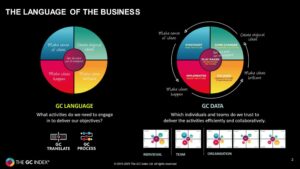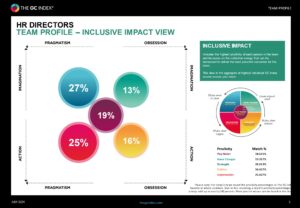This is where tools like The GC Index can play a transformative role. By providing data that helps HR align more closely with business objectives, empowering HR to step beyond traditional people management and become a strategic player in the organisation. Moreover, its ability to leverage big data gives HR professionals the quantitative insights they can take to the business to make better decisions and drive measurable results.
The Four Ps of HR: Transitioning to a Strategic Role
Before we dive deeper into the role of big data, it’s important to revisit a framework that captures HR’s potential evolution in organisations: the Four Ps – Polite, Police, Partner, and Player.
Polite: HR operates as a passive function, doing what the business asks without actively contributing to business strategy.
Police: HR enforces policies and procedures, ensuring compliance and maintaining order.
Partner: HR becomes more embedded in business decisions, working closely with leadership to address talent and culture-related issues.
Player: At this stage, HR is a key decision-maker, contributing directly to the business strategy and shaping how the organisation moves forward.
The goal for HR leaders is to move from the ‘Polite’ and ‘Police’ roles, where HR is reactive, to becoming a strategic ‘Partner’ and ‘Player’, where HR has the power to shape business outcomes.
Data-Driven insights to drive HR strategy
One of the major challenges HR faces is how to demonstrate its value in quantifiable terms. While HR has traditionally focused on qualitative assessments like employee engagement, personality, emotional intelligence, and cultural fit, these are often viewed as “soft” metrics by business leaders that are difficult to link directly to commercial and productivity outcomes. So Instead of focusing solely on personality traits, behaviours or emotional intelligence, The GC Index evaluates individuals based on their energy for impact in a business context. This data is organised around five key proclivities:
Play Maker: Individuals who are people-focused and drive impact through stakeholder management, employee engagement, and maximising team performance.
Game Changer: Visionaries who bring new ideas and inventive thinking to the table, offering original solutions to business challenges.
Strategist: Big-picture thinkers who can map out the direction for the organisation and align its efforts with its longer-term objectives.
Implementer: Results-oriented individuals who excel at getting things done, focusing on execution and driving measurable results.
Polisher: Individuals who focus on continuous improvement, ensuring that processes are refined and outcomes are optimised.

By mapping these proclivities against different phases of the business cycle, HR leaders can match the right people with the right roles and build teams that are designed to drive both innovation and execution.
Big Data Insights: What HR Can Learn from Sector-Wide Trends
Beyond individual assessments, the ability to aggregate people impact data across large populations, allows HR leaders to gain insights into sector-wide trends and benchmark their own organisations against industry norms. For instance, analysed data from 1,200 HR directors, providing a unique perspective on the types of impact that HR leaders are energised to deliver.

One of the most significant findings from this data is that over 50% of HR directors demonstrate a proclivity for Strategist or Implementer roles. This means that the majority of HR leaders are focused on making sense of the business and delivering results – challenging the stereotype that HR is primarily concerned with the softer, people-focused side of the business.
Strategists represent a significant portion of HR Directors, with a focus on ensuring that the HR function is aligned with the overall business strategy. At their best these HR leaders are concerned with how HR initiatives, such as talent development and succession planning, fit into the broader business goals.
Implementers, who make up another substantial portion, are focused on execution – ensuring that projects are delivered on time and that business objectives are met. This suggests that HR leaders are increasingly seen as strategic doers rather than mere administrators of people processes.
Interestingly, while 19% of HR Directors are people-focused Play Makers, it is clear that this is not the dominant energy in the HR profession. The big data shows that HR is not just about managing people or maintaining culture—it is also about driving business outcomes through strategy and execution. This represents a significant shift in how HR can be viewed and valued within organisations.
Moving Beyond the Stereotype: HR as a Strategic Player
This data challenges the traditional view of HR as a “soft” function and provides concrete evidence that HR professionals are strategically focused and results-driven. It shows that HR Directors are not just managing the workforce but also have the propensity to actively shape business strategy and driving bottom-line performance.
For example, with over 25% of HR directors showing an Implementer proclivity, the data suggests that HR leaders are focused on achieving results—whether it’s executing HR strategies to support business growth, rolling out new learning and development programs to drive excellence in the business, or ensuring compliance with regulations to reduce business risk. This dispels the notion that HR is purely about the “softer” people skills and reinforces the idea that HR can be a powerful driver of business results.
Moreover, the data shows that 13% of HR Directors who exhibit a strong Game Changer proclivity highlights HR’s potential to drive transformation. As businesses face increasing challenges such as remote work, AI integration, and changing workforce demographics, HR’s ability to bring original thinking and new possibilities to the table is more valuable than ever. These data insights emphasise the need for organisations to embrace the creativity and forward-thinking that HR can provide, particularly in the face of digital transformation and changing workplace norms.
The power of big data in HR
The ability to leverage big data gives HR leaders a new way of looking at their teams and their own roles within the organisation. With this data, HR can make more informed decisions about:
Business Alignment: The data shows that HR professionals, particularly those with Strategist and Implementer proclivities, are keenly aware of the need to align HR initiatives with business goals. This alignment helps HR move beyond being a “support function” and become a driver of business success.
Diversity and Inclusion: HR can understand and leverage different types of impact, ensuring that teams are diverse not just in demographics, but in how they contribute to the organisation. This promotes a more inclusive work environment where different perspectives are valued.
Team Composition: HR can use the data to ensure that teams are composed of individuals whose impact proclivities complement each other, creating a balance between innovation, execution, and improvement and aligning the team to achieve its objectives
Succession Planning: By identifying how current leaders and high-potential employees are energised to make an impact, HR can develop more effective succession plans that ensure the organisation is prepared for future leadership transitions.
Recruitment and Retention: Instead of relying solely on traditional recruitment metrics, HR can use The GC Index to identify candidates who will make the right kind of impact based on the organisation’s needs – whether it’s driving innovation, executing strategies, or improving processes.
Back up their initiatives with quantifiable evidence
The combination of individual-level data and sector-wide big data allows HR professionals to back up their initiatives with quantifiable evidence. This not only strengthens HR’s position within the organisation but also helps to elevate HR to the executive table, where it can play a more strategic role in shaping the future of the business.
HR is no longer just about “looking after the People Agenda”- it’s about driving impact. HR leaders can ensure that they are seen as essential business players, contributing directly to the success of the organisation. As HR continues to embrace data-driven decision-making, it has the potential to move up the Four Ps framework, becoming a partner and player in the organisation’s strategy and success.
The GC Index provides HR professionals with the data, framework, and language they need to better connect with the business and drive measurable results. By embracing individual, organisational and big data insights, HR can transition from being seen as a cost centre or compliance function to becoming a strategic partner and player in the organisation’s success and having a a lasting and impactful seat at the executive table.







